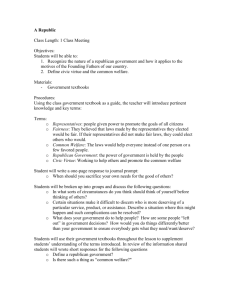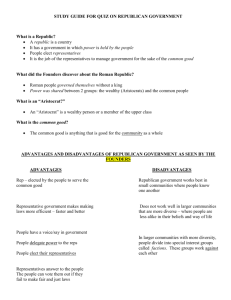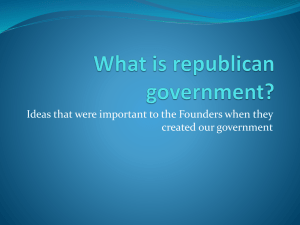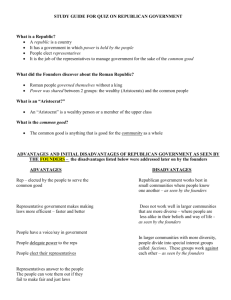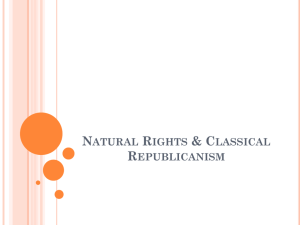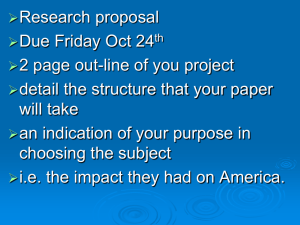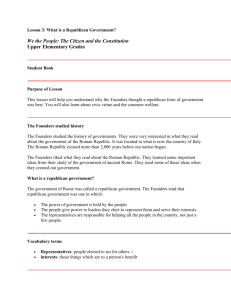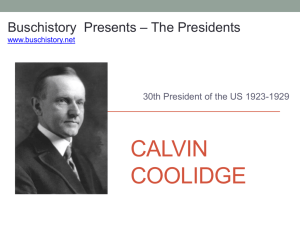What is republican government - socialstudiesNCUHS
advertisement
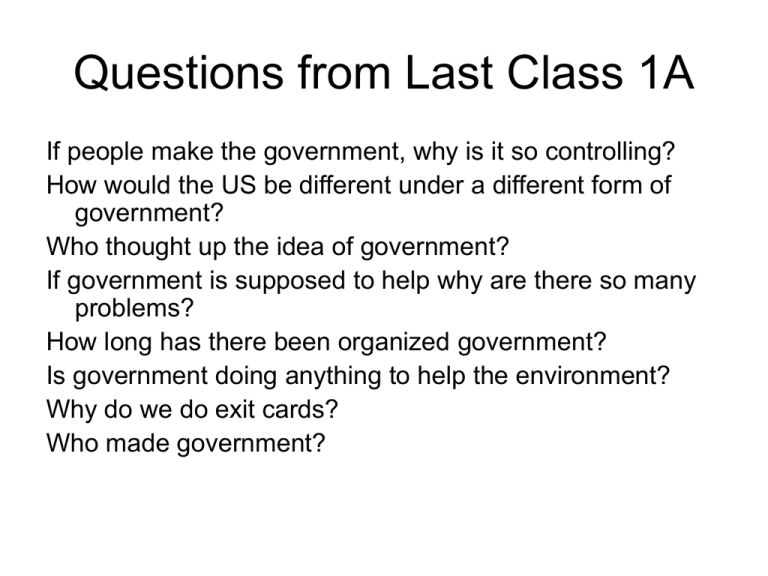
Questions from Last Class 1A If people make the government, why is it so controlling? How would the US be different under a different form of government? Who thought up the idea of government? If government is supposed to help why are there so many problems? How long has there been organized government? Is government doing anything to help the environment? Why do we do exit cards? Who made government? What is republican government? We The People: The Citizen & the Constitution Level 2 Objectives Students will be able to: Explain the ideas of republican government, the common good, and civic virtue State some of the advantages and disadvantages of republican government Explain why the Founders thought republican government was the best type of government Describe how the ideas of republican government were promoted Terms to Understand AristocratsCivic virtueCommon goodDelegateDirect democracyFactionsRepresentativeRepresentative democracyRepublicRepublican government- What did the Founders learn about government from the Romans? Roman Republic – (509-27 BC) government in which power is held by people who elect representatives. - Citizens have power to govern - Citizens delegate or entrust their power to leaders they elect to represent them and serve their interest - Citizens and their representatives work cooperatively to promote the common good rather than their own interest. What Advantages did the Founders see in Republican government? + Serve the common good + Make the laws more efficiently Good laws require understanding which require time + People influence government Not direct, but more efficient + Representatives are responsible to people Can be removed/voted out What were the disadvantages of republican government? - Works best in small communities; colonies were not. - Works best in homogenous communities; colonies were not. - People in large and diverse republics divide into factions, who would work towards private interest rather than public good. How did the Founders adapt the idea of republican government? Form Direct Democracy Who makes laws People directly What setting does it work best Small, homogenous community Republican/ Representative Democracy Reps. elected by majority Larger, diverse areas Why should citizens promote the common good? Read p. 26 and answer questions 1-5 1. What is the common good as represented in this story? What are the self interests in the story? Common good: need to protect Rome from invaders Self-interest: Cincinnatus – farming Leaders – asking Cincinnatus to assume power Why should citizens promote the common good? 2. Describe a person you know or a leader who has civic virtue. Give reasons for your opinion based on the person’s life. Why should citizens promote the common good? 3. Explain some situations where you think you should put the common good above your own interests. - Following school/family rules - Obeying traffic signs - Not interfering with other students learning - Getting vaccinated - Not coming to school when sick Why should citizens promote the common good? 4. Explain some situations in which you might not want to put the common good above your own interest. - The state plans to build a freeway through your home, or low income housing, or a prison N.I.M.B.Y Not In My Back Yard Why should citizens promote the common good? 5. Explain some situation in which people might disagree about what is best for the common good. What should be done when there are such disagreements? - ex. Banning or allowing flag burning, how should firearms be regulated (bullet control?) Why should citizens promote the common good? Zombie Infection Scenario: We are uninfected humans, but Mr. Szymanski has been infected and will soon become one of the undead. If you leave me alive, I could infect others. If you throw me out into the group, they will rip me apart. Q: What action could be taken to promote the common good be? Q: What would a natural right philosopher suggest that you do? Why is civic virtue necessary for republican government to work well? Civic virtue – both citizens and leaders willing to set aside private interest for public good When citizens cease to participate, the government ceases to represent the common good. (i.e. voting) People cannot always be counted on to make the right decision. Q: Can self-interest lead to common good? Give an example. How did the Colonists teach the values of republican government? - school, church, parenting - Architecture, public leadership, use of Latin, “Senator”, - conscious comparison to Roman Republic G. Washington = “our Cincinnatus” British government served “self-interest” of parent country instead of common good of all British subjects. Lesson Review 1. What is a republican government? What are + / -? + Serves the common good + Representatives make laws + More efficient + People have say by: 1. Electing representatives 2. Representatives are accountable. Lesson Review 1. What is a republican government? What are + / -? - Works best in small, homogenous communities - Large diverse populations divide into factions who work toward private interest rather than public good. Lesson Review 2. What is the meaning of the term “Common good”? - The common good is that which is good for the community as a whole. Lesson Review 3. What is the difference between direct democracy and representative democracy? In a direct democracy, people themselves make the laws and control the government. In a representative democracy laws are made by representatives. Lesson Review 4. What is civic virtue? Why is it important that citizens and representatives have civic virtue? Civic virtue is the willingness to put common good before personal interest. Who will citizens elect if they are self interested? What will representatives do if they are selfinterested? Lesson Review 5. How were the values of republican government promoted in the colonies? Why were these values promoted? -Parents taught children, etc. The values were promoted because they make effective republican government possible.
